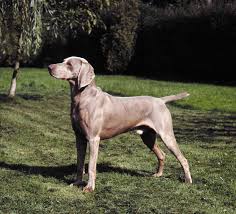
Weimaraner
Conditions of detention
Weimaraners thrive in environments where they have plenty of space to roam and exercise. They are best suited for homes with large yards or rural properties where they can engage in physical activities and enjoy mental stimulation.
Useful Fact:
Weimaraners are highly energetic dogs that require at least one to two hours of exercise daily, making them ideal companions for active families or individuals who enjoy outdoor activities.
Nutrition and diet
A balanced diet rich in high-quality proteins and essential nutrients is crucial for the Weimaraner to support its active lifestyle. High-quality commercial dog food or a diet incorporating lean meats, vegetables, and grains is recommended.
Useful Fact:
Feeding a diet that supports their energy levels and muscle mass helps maintain their health and vitality, especially given their active nature.
Health
Weimaraners are generally healthy dogs but can be prone to certain genetic conditions such as hip dysplasia, bloat (gastric torsion), and eye problems. Regular veterinary check-ups are essential to monitor their health.
Useful Fact:
Preventive measures, such as feeding smaller, frequent meals and avoiding vigorous exercise immediately after eating, can help reduce the risk of bloat.
Grooming and care
The Weimaraner has a short, sleek coat that requires minimal grooming. Regular brushing helps remove loose hair and keep their coat healthy and shiny.
Useful Fact:
Their coat is relatively low-maintenance, requiring only occasional baths and regular brushing to maintain cleanliness.
Education and training
Weimaraners are intelligent and eager to please, making them relatively easy to train. However, they can also be strong-willed and require consistent, positive reinforcement methods for effective training.
Useful Fact:
Early socialization and obedience training are crucial to ensure they develop into well-mannered dogs that are comfortable around people and other animals.
Toys and entertainment
These dogs enjoy toys that challenge their minds and bodies, such as puzzle toys, fetch toys, and interactive games. Engaging in activities like agility training and scent work can be very stimulating for them.
Useful Fact:
Providing a variety of toys and regular playtime helps keep them mentally and physically active, preventing boredom and destructive behavior.
Safety
Due to their strong prey drive and high energy levels, Weimaraners should be kept in a secure area when outdoors. They need to be monitored to prevent them from wandering off or chasing wildlife.
Useful Fact:
A well-fenced yard is essential to give them the freedom to roam safely without the risk of escaping.
Accessories
Sturdy collars, harnesses, and leashes are important for managing the Weimaraner during training and outdoor activities.
Useful Fact:
Using a harness can provide better control and prevent neck strain, especially during walks and training sessions.
Socialization
Weimaraners are friendly and form strong bonds with their families but can be reserved with strangers. Early and consistent socialization is important to ensure they are comfortable in various environments.
Useful Fact:
Introducing them to different people, animals, and settings from a young age helps them become well-adjusted and confident adults.
Travel and Transportation
Weimaraners can travel well if they are accustomed to it from a young age. Ensuring they have a comfortable and secure space in the vehicle is important.
Useful Fact:
Using a travel crate or a harness designed for car travel ensures their safety and comfort during trips.
Behavior and psychology
The Weimaraner is known for its loyalty, intelligence, and affectionate nature. They form strong bonds with their families and are naturally protective.
Useful Fact:
Understanding their need for companionship and providing proper training can help manage their behavior and ensure they are confident and well-behaved.
Legal aspects
Owners should comply with general dog ownership laws, such as licensing, vaccination requirements, and leash laws.
Useful Fact:
In some areas, there may be specific regulations regarding hunting breeds, so checking local laws is important.


